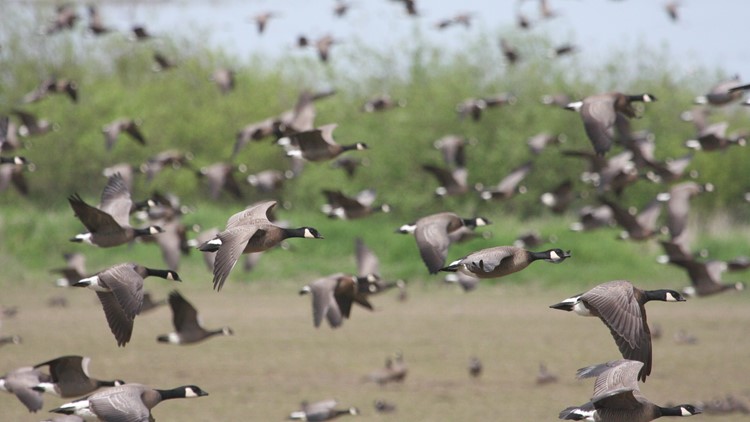SALEM, Oregon — Oregon is seeing an uptick in avian flu cases and deaths in wild birds this fall, according to Oregon Fish and Wildlife (ODFW). The state has been the first to report a new spike in detections as geese and other migratory waterfowl return for the winter.
The current strain, H5N1, is from Highly Pathogenic Avian Influenza (HPAI), first detected in North American birds in Dec. 2021, then in Oregon in May 2022. Strains from earlier outbreaks have typically disappeared by the following spring, but the current strain has continued to circulate in wild birds, as well as backyard poultry flocks, dairy herds and livestock.
A pig from a Crook County farm was recently found to have bird flu, the first time the virus has been detected in American pigs, raising concern about the disease becoming a threat to humans. The strain has also infected dairy cattle in 14 states, ODFW said.
The agency warns that avian flu deaths are mostly occurring in cackling geese gathering in the Willamette Valley, especially juveniles, and wild ducks that are harvested by hunters in Oregon. Though people appear to be at low risk for infection with the current strain, according to the U.S. Centers for Disease Control and Prevention (CDC), people should avoid handling sick or dead wildlife.
If someone must dispose of a carcass, ODFW advises that they wear impermeable gloves or use a shovel, then wash their hands with soap and water and change clothing before having contact with pet birds or backyard poultry.
If you find sick or dead wild birds, you can report them to the Wildlife Health lab at 866-968-2600 or wildlife.health@odfw.oregon.gov. If your domestic birds are affected, report them to the Oregon Department of Agriculture via 503-986-4711.
Meanwhile, hunters should wear gloves and eye protection while cleaning game birds and keep them away from other foods, then thoroughly disinfect knives and other equipment that's touched the birds; do not feed other animals the birds' raw meat, organs, etc. While cooking wild birds, make sure the internal temperature is at least 165 degrees Fahrenheit. Falconers should also avoid hunting waterfowl.
Nationwide, there have been 10,400 detections in 153 species of wild birds, as well as in at least 20 mammals, including coyotes, foxes and skunks.
Meanwhile, three new HPAI cases are being monitored after three people from Washington traveled to Oregon, then back, according to the Oregon Health Authority (OHA).
“At this time, the risk for the general public remains low,” said Dr. Melissa Sutton, OHA's medical director for respiratory viral pathogens. “People who have had close or prolonged, unprotected exposures to infected birds or other animals, or to environments contaminated by infected birds or other animals, are at increased risk of infection.”
OHA added that people should avoid contact with sick or dead animals and should not consume raw dairy products.
HPAI has also been confirmed in a backyard flock of geese and chickens located in Jackson County, according to the U.S. Department of Agriculture.



